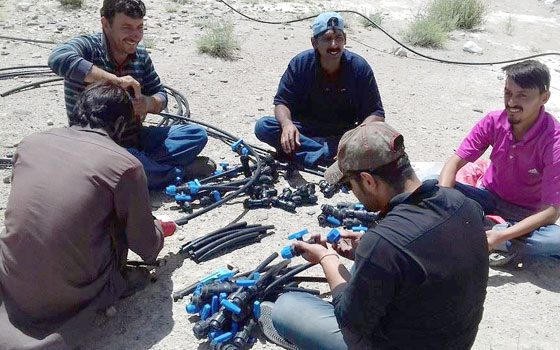The Hunza River Basin in Gilgit-Baltistan faces significant challenges in agricultural water management, which directly impacts the livelihoods of the local communities and the sustainability of agricultural practices. This article delves into the pressing issue of water scarcity in the region and explores whether solar water pumps can serve as an alternative solution to address agricultural water management challenges.
Water Scarcity in the Hunza River Basin:
The Hunza River Basin is characterized by limited water resources, particularly during the dry seasons when agricultural activities heavily rely on irrigation. The traditional methods of water extraction, such as diesel or electric pumps, are often costly and unsustainable due to the region’s remote locations and inadequate access to electricity infrastructure. Consequently, farmers face significant obstacles in securing a reliable water supply for their crops, which hampers agricultural productivity and economic growth.
The Potential of Solar Water Pumps:
Solar water pumps have emerged as a promising alternative for agricultural water management in areas with limited access to grid electricity. By harnessing solar energy, these pumps utilize photovoltaic panels to power the water pumping systems. Solar water pumps offer several advantages over traditional pumps, including:
- Cost-Effectiveness: Solar water pumps eliminate the need for expensive diesel or electric power, resulting in reduced operating costs for farmers in the long run.
- Environmental Sustainability: Solar water pumps produce clean energy, reducing greenhouse gas emissions and minimizing the ecological footprint of agricultural activities. They align with sustainable agricultural practices and contribute to environmental preservation.
- Reliability and Independence: Solar water pumps provide a reliable and consistent water supply, as they are not dependent on grid electricity. This ensures uninterrupted irrigation for farmers, even in remote areas where electricity infrastructure is limited.
- Low Maintenance: Solar water pumps have fewer moving parts compared to traditional pumps, resulting in reduced maintenance requirements and costs. This makes them well-suited for remote and harsh environments like the Hunza River Basin.
Challenges and Considerations:
While solar water pumps offer significant potential, their implementation in the Hunza River Basin faces certain challenges and considerations. These include:
- Initial Investment: The upfront cost of installing solar water pumps may pose a financial barrier for small-scale farmers. However, various government subsidies, grants, and financing options are available to support the adoption of renewable energy technologies.
- Technical Expertise: Adequate technical know-how and training are essential for the successful installation, operation, and maintenance of solar water pump systems. Capacity-building initiatives and training programs can help farmers navigate this aspect effectively.
- Water Demand and Efficiency: Proper water management practices, including efficient irrigation techniques and water conservation measures, need to be implemented alongside solar water pumps to optimize water usage and enhance agricultural productivity.
- Integration with Existing Systems: Integration of solar water pumps into the existing agricultural water management infrastructure, such as canal networks and storage systems, should be carefully planned and executed to ensure seamless operation and maximize benefits.

The adoption of solar water pumps presents a promising opportunity to address agricultural water management challenges in the Hunza River Basin. By harnessing clean and sustainable solar energy, these pumps can provide reliable and cost-effective irrigation solutions for farmers while reducing the environmental impact of agricultural practices. However, careful planning, investment support, technical capacity-building, and efficient water management strategies are crucial for the successful implementation and integration of solar water pumps. With concerted efforts and collaboration, the agricultural sector in the Hunza River Basin can embark on a path of enhanced water sustainability, increased agricultural productivity, and improved livelihoods for the local communities.




